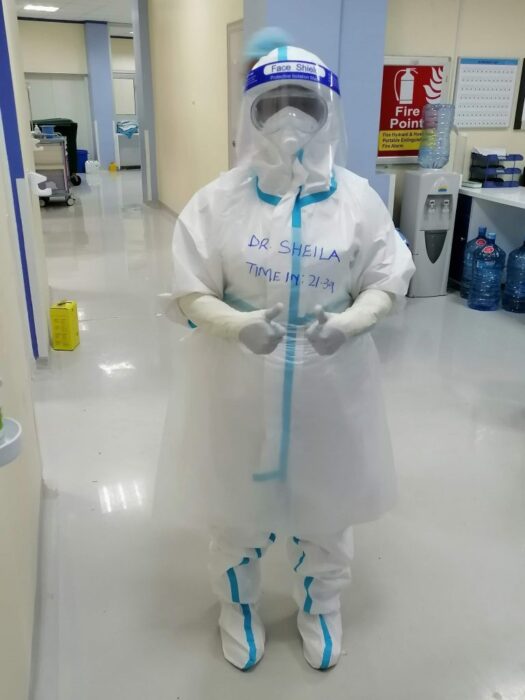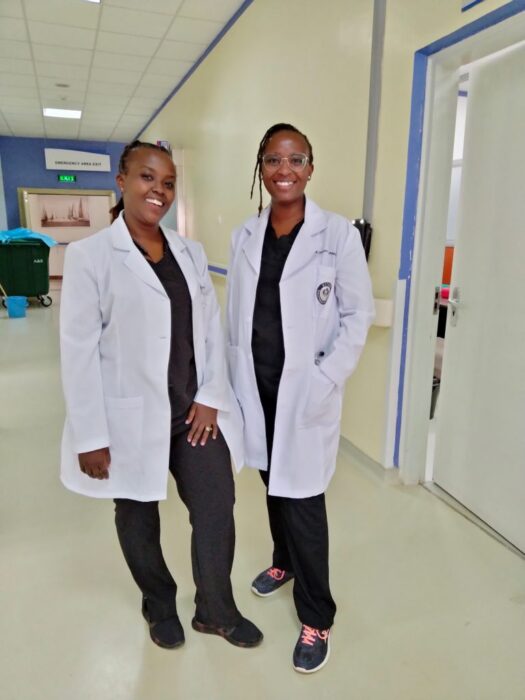Dr Sheila Kirongothi is a medical doctor working at KUTRRH Critical Care Department and has been a frontline worker against COVID-19 pandemic in Kenya. She graduated from Kenyatta University School of Medicine in 2019. She is an aspiring anaesthesiologist and critical care physician.
My name is Sheila Kirongothi, I am a Senior House officer in the critical care department at Kenyatta University Teaching Research and Referral Hospital. Since childhood, my soul drove me to become a medical doctor. Let’s imagine my childhood life: a three-year-old girl who could barely pronounce her name but was busy playing as a doctor with her dolls. I knew from when I was very young, that I wanted to be a doctor. As I grew older, my daily experiences affirmed that I believe in an altruistic, patient-centred healthcare system.
I joined the Kenyatta University Teaching Referral and Research Hospital (KUTRRH) internship just as the COVID-19 pandemic began to gain footing in Kenya. KUTRRH became designated as a COVID-19 centre and before long it was all hands-on deck. Working in an ICU at the peak of a pandemic has got to be one of my most challenging and humbling experiences yet. A doctor is trained to provide care for sick patients. Patients come to you seeking answers as to what’s wrong with them, and by extension, seeking a message of hope that, with these few interventions, all will be well. The pandemic has brought a lot of despair and grief amongst patients and their loved ones. Healthcare workers have felt frustrated and desperate as they battle a disease that is barely understood, that met an unprepared healthcare system. Watching people die in devastating numbers was a nightmare. It was important to isolate yourself from family and friends so as not to expose them. Watching colleagues fight and lose the battle to COVID-19 was also extremely difficult.

But somewhere in there were moments of triumph, like when we would discharge patients from the ICU. There were also moments of hope, like when we received news that a certain drug has been shown by research to improve outcomes in critical COVID-19 patients, and a vaccine had become available.
This was nature’s way of forcing us to strengthen the healthcare system, work on our preparedness, increase staff capacity, and acquire further equipment. COVID-19 has shown us that it is possible to provide care for patients in the comfort of their homes, further promoting patient-centred care. Ultimately, once this pandemic is over, the strides made in the healthcare system will remain.

I first interacted with CGHP when I served as coordinator and moderator of fortnightly critical care clinical advice sessions between KUTRRH and hospitals affiliated with CGHP in the UK. These sessions served as a platform to discuss management of challenging critical COVID-19 patients. The sessions were very insightful as they gave us an opportunity to learn from each other, and to decipher how best to manage our COVID-19 patients. The highlight of the sessions was the opportunity to widen my professional network and meet inspirational doctors at different levels of their careers. The larger partnership between CGHP and KUTRRH involves setting up the cardiothoracic surgery program at KUTRRH.
I aspire to pursue postgraduate studies in anaesthesiology and critical care to provide best anaesthesia practice and patient-centred critical care services. My brief interaction with the team at CGHP has been extremely delightful and I hope to do more work with them in future.
Return to case studies

